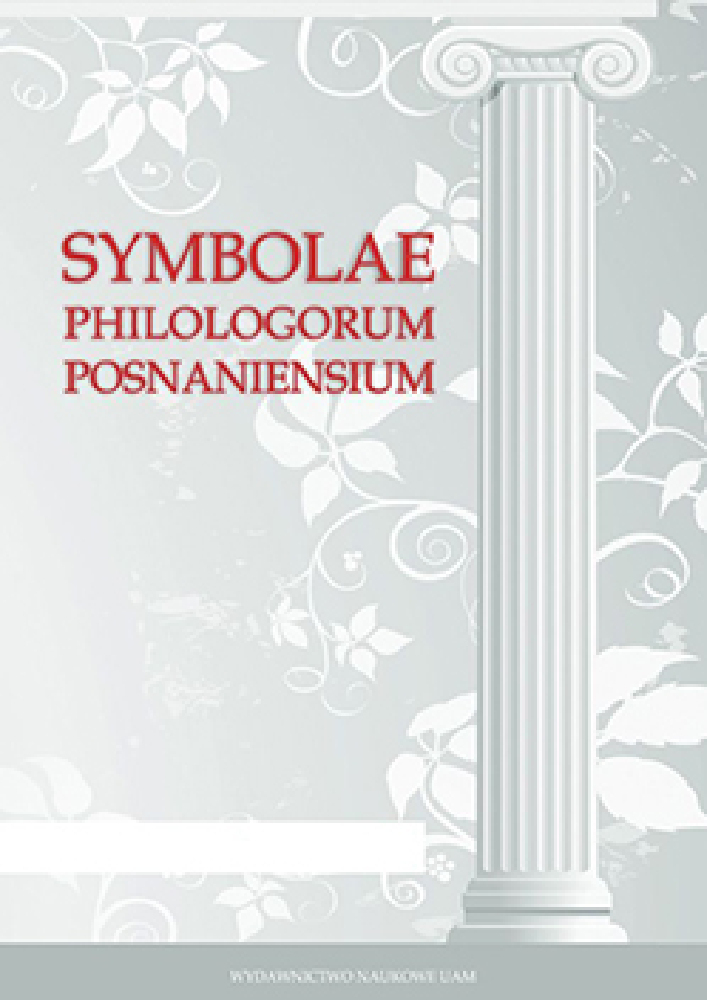Abstrakt
The main purpose of this paper is to present the variable and diverse Ovid’s attitude towards Muses in his works from exile (Tristia, Epistulae ex Ponto and Ibis). The poet seeks in these goddesses both the comfort and the cause of his exile, identifies them with his poetry frequently, as their faithful servant feels deceived but also hopes that Muses can ease the anger of Augustus. The article is an attempt to analyze this complex relationship.
Bibliografia
Owidiusz, Żale, tłum. M. Puk, E. Wesołowska, wstęp A. Wójcik, Poznań 2002.
Owidiusz, Poezje wygnańcze. Wybór, tłum. E. Wesołowska, wstęp A. Wójcik, Toruń 2006.
Ovid, The Poems of Exile (Tristia, Ex Ponto, Ibis), tłum. A.S. Kline, w: [http://uploads.worldlibrary.net/uploads/pdf/20121106192032ovidpoemsfromexilepdf_pdf.pdf].
Ovid, Tristia, Epistulae ex Ponto, Ibis, w: [http://www.thelatinlibrary.com/ovid.html].
Owidiusz, Sztuka kochania, tłum., wstęp E. Skwara, Wrocław 2015.
Atsma, A. J. Atsma, Mousai, w: The Theoi Project: Greek mythology. Exploring mythology in classical literature and art., w: [https://www.theoi.com/Ouranios/Mousai.html].
Berens 2009: E.M. Berens, The Myths and Legends of Ancient Greece and Rome, Amsterdam 2009.
Bourdieu 1991: P. Bourdieu, Language and Symbolic Power, tłum. G. Raymond, M. Adamson, Oxford 1991.
Bömer 1976: F. Bömer, P. Ovidius Naso, Metamorphosen. Kommentar, Buch IV–V, Heidelberg 1976.
Brandstaetter 1976: R. Brandstaetter, Rachunek kamieni, w: Roman Brandsteatter, Pieśń o moim Chrystusie, Warszawa 1976.
Citroni Marchetti 2000: S. Citroni Marchetti, Amicizia e potere nelle lettere di Cicerone e nelle elegie ovidiane dall’esilio, Florencja 2000.
Cook 2013: A.M. Cook, Of Memory and Muses: The wellsprings of creativity, Montana 2013.
Cytowska, Szelest 1990: M. Cytowska, H. Szelest, Literatura rzymska: okres augustowski, t. III, Warszawa 1990.
Fränkel 1970: H. Fränkel, Ovid. Ein Dichter zwischen zwei Welten, Darmstadt 1970.
Gawarecka 2011: A. Gawarecka, Dlaczego Owidiusz został wygnany? Literatura jako narzędzie rozwiązywania zagadek z przeszłości, „Slavia Occidentalis” 68 (2011), 65–76.
Grimal 2008: P. Grimal, Słownik mitologii greckiej i rzymskiej, tłum. M. Bronarska, Wrocław 2008.
Liveley 2011: G. Liveley, Ovid’s „Metamorphoses”. A Reader’s Guide, Londyn–Nowy Jork 2011.
McHugh 1993: K.P. McHugh, The Muses and creative inspiration: Homer to Milton, North Florida University 1993.
Mojsik 2011: T. Mojsik, Antropologia metapoetyki. Muzy w kulturze greckiej od Homera do końca V w. p.n.e., Warszawa 2011.
Pigoń 2020: J. Pigoń, Fama novi fontis. Aluzje metapoetyckie w opowiadaniu o odwiedzinach Minerwy na Helikonie (Owidiusz, „Metamorfozy” V 250–293), w: Dwa millenia z Owidiuszem, red. Ł. Berger, M. Miazek-Męczyńska, M. Puk, E. Skwara, E. Wesołowska, Poznań 2020, 9–28.
Puk 2013: M. Puk, Mitologia w wygnańczych utworach Owidiusza, Poznań 2013.
Silvestri 2009: D. Silvestri, Le parole dell’esilio, w: Ovidio: l’esilio e altri esili, red. S. Cardone, G. Carugno, A. Colangelo, G. Giorgi, Sulmona 2009.
Stabryła 1989: S. Stabryła, Owidiusz. Świat poetycki, Wrocław 1989.
Williams 1994: G.D. Williams, Banished voices. Readings in Ovid’s exile poetry, Cambridge 1994.
Wójcik 2003: A. Wójcik, Owidiusz – poezje znad Morza Czarnego, Poznań 2003.
[https://hellenicfaith.com/do-ut-des/]
[https://www.astrosynthesis.com.au/wp-content/uploads/2017/11/greek-goddessmnemosynebrian-clark.pdf]
[https://www.theguardian.com/books/2005/jun/18/featuresreviews.guardianreview11]
[https://classical-inquiries.chs.harvard.edu/a-re-invocation-of-the-muse-for-the-homeric-iliad/]
[https://dictionary.cambridge.org/pl/dictionary/english/femme-fatale]
Licencja
Prawa autorskie (c) 2021 Monika Moskalewicz

Utwór dostępny jest na licencji Creative Commons Uznanie autorstwa 4.0 Międzynarodowe.
